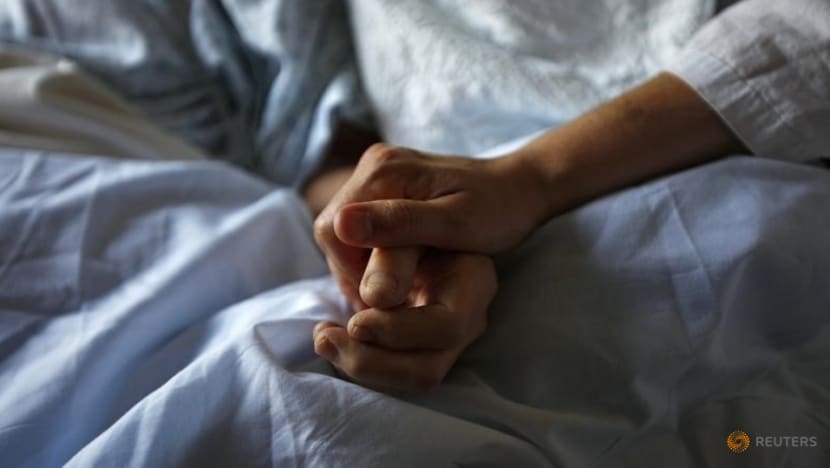Higher subsidies, MediShield Life claim limits for palliative care from 2024

The 2023 National Strategy for Palliative Care was launched on Jul 1, 2023, outlining recommendations to expand and improve palliative care in Singapore. (File photo: Reuters/Shaun Best)
SINGAPORE: Palliative care patients will get more financial help from next year as Singapore's Ministry of Health (MOH) announced plans to increase subsidies and MediShield Life claim limits.
The changes were revealed on Saturday (Jul 1) at the launch of the 2023 National Strategy for Palliative Care, which outlined recommendations to expand and improve palliative care in Singapore.
Stronger financial support in palliative care will help improve affordability and boost capacity expansion, which will in turn allow service providers to support more patients in meeting their preferences to die at home, said the Ministry of Health in a news release.
Subsidies for inpatient palliative care, home palliative care, and day hospice care will be raised in the fourth quarter of 2024.
Under the revised framework, all Singapore citizens will receive subsidies of at least 50 per cent, regardless of their per capita household income. Almost all patients will benefit from higher subsidies, with increases of up to 55 percentage points.
MediShield Life claim limits for inpatient palliative care will also be raised. The daily claim limits will be increased from S$250 to S$460 for general inpatient palliative care, and from S$350 to S$500 for specialised inpatient palliative care.
In addition, the MediSave S$2,500 lifetime withdrawal limit for all home palliative care and day hospice patients who use their own MediSave will be removed. However, the limit will remain for patients who tap on their family members’ MediSave.
The MediShield Life and MediSave changes will be implemented in the first quarter of 2024.
Another enhancement will come in the area of drug and vaccine subsidies for long-term medical care services, such as nursing home, home medical, and palliative care services.
Currently, such subsidies are only extended to long-term medical care patients from lower- to middle-income households.
"Moving forward, we will extend drug and vaccine subsidies of at least 50 per cent, similar to what they would receive at public healthcare institutions, to all patients of MOH-funded providers of eligible long-term medical care services," said MOH.
"This will improve access to subsidised drugs and vaccines, especially for homebound patients."
MOH will also align drug and vaccine subsidies for patients utilising nursing home, home medical, home palliative care, and day hospice services with those at specialist outpatient clinics. The changes will start in the fourth quarter of 2024.
Speaking at the Singapore Palliative Care Conference on Saturday, Health Minister Ong Ye Kung noted that as times and circumstances have changed when it comes to dealing with the topic of death, policies and practices should change as well.
"Surveys done by the Lien Foundation show that three in four seniors prefer to pass on at home. Doctors have told me that in their conversations with patients it was more like nine in 10," he said at the event at the Sands Expo & Convention Centre.
"It is time we recognise that palliative care can make a huge difference. It provides comfort not just to patients but also their caregivers, going beyond physical to also emotional and spiritual care, while honouring the wishes of the patients," he added.
The stronger financing support also helps to "unlock the capacity constraints" of palliative care providers in Singapore, said Mr Ong.
"As the population ages and demand for palliative care rises, and care providers have reached the limit of what they can raise every year as charity dollars, they hit a capacity limit," he added.
"So even when there is a willing referral or compassionate discharge from a hospital to home palliative care, providers may no longer have the resources to support the family and caregivers."
Mr Ong also highlighted the need to recruit and train workers in the palliative care sector.
Beyond developing talent in the hospice sector, he said that more support will be provided so that nursing homes, home care, and family doctors can play a larger role in caring for their patients approaching their end of life.
"We will pilot new care models, for instance, having home medical and nursing providers care for their patients with complex chronic conditions and frailty, towards the end of life, with the support of specialised palliative care providers," he said.
Other initiatives announced include measures to smoothen the process of care transitions, from acute hospital care to palliative care, and between palliative settings, whether it is inpatient, day, or home hospice.
Public awareness and community engagement efforts to explain to the public the advantages of planning ahead will also be stepped up.
It was revealed in parliament in May that the number of people receiving community palliative care in Singapore went up by 30 per cent in the past five years.
About 8,800 terminally ill people received such care in 2022.
This article was originally published on ChannelNewsAsia. Its inclusion on this website is solely for education purposes.




No comments
Share your thoughts! Tell us your name and class for a gift (: